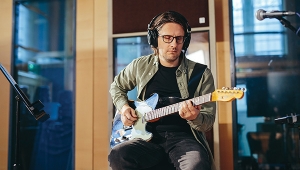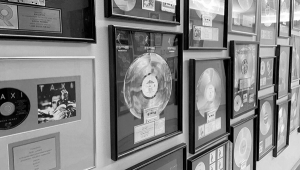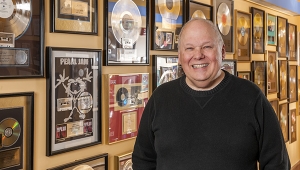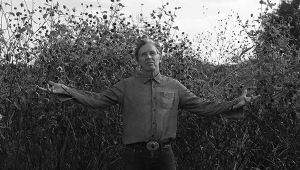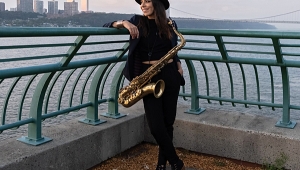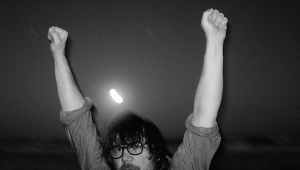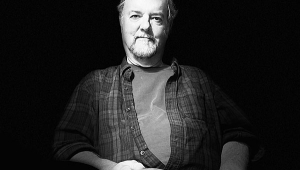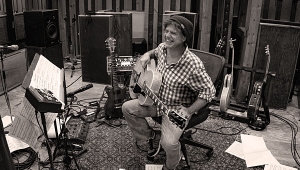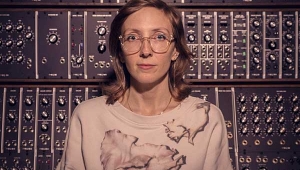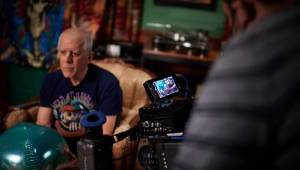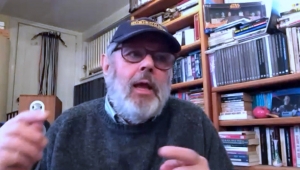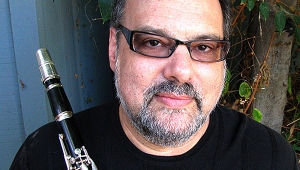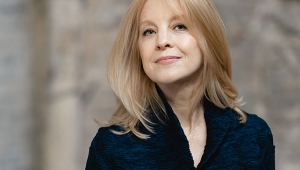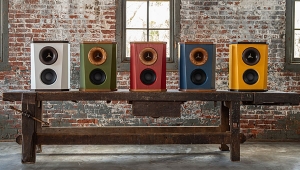| Columns Retired Columns & Blogs |
Amazing Stuff: Klaus Heymann of Naxos Page 4
Tellig: Will Naxos adopt SACD or DVD?
Heymann: I think DVD-Audio will win the day. Super Audio CD is too expensive, and it's a one-format standard. In a little while, DVD players will play DVD-Video, DVD-Audio, and CDs. These multi-format players will not play Super Audio CDs.
We are prepared. We have been recording for the past three years in six-channel surround, which we can adapt to five-channel surround. I am very keen on the long playing times of DVD-Audio in 16-bit/44kHz, because then we could put the Haydn string quartets on 4 DVDs, saving dealers and customers a lot of space.
Tellig: Would this save customers money?
Heymann: Sure. You have a sliding scale: As time goes up, manufacturing cost goes down, so you pass on the savings to the consumer. You charge for the recordings by the hour, instead of by the disc, and give people a discount: one hour is $7, two hours are $12, three hours are $16, and so forth.
Tellig: Do you think most recordings will be two-channel 16/44?
Heymann: No, most will go to 24-bit/96kHz. Twenty-bit recordings can be adapted to 24-bit. We have a lot of 20-bit recordings already. From 16 to 20 bits I hear an audible improvement. From 20 to 24, bits, I can't hear any more. But surround sound is a major improvement over two-channel if it's well done—if it's natural, not gimmicky surround.
I remember hearing some demonstrations. Even 16-bit surround blew 20- and 24-bit stereo out of the water. Dramatic improvement.
Tellig: Do you think surround sound will succeed?
Heymann: This time, yes. Last time we had surround, 25 years ago, there were different formats and a problem of equipment. Today a lot of people already have surround sound in the home for home cinema. Feeding surround-sound audio into those systems is easy.
Tellig: You must have recorded everything. Are you scraping the bottom of the barrel, or is it time to re-record everything you recorded 10 years ago in better sound?
Heymann: We are doing the latter anyway. We think some of the older recordings should be re-done—new versions of the works. But that's not because we are running out of things to record.
If you look only at the major composers, there is no complete recorded Vivaldi, although we've recorded a good many of the concertos. There's no complete Mendelssohn. I don't think there's a complete Haydn yet. No complete Telemann. We have a lot of Cannabich, Stamitz, and Vanhal to record. Dittersdorf wrote 110 symphonies. If you can consider him the next Haydn, there's a lot of work for all of us. There are other contemporaries of Mozart and Haydn, and much of it is wonderful music.
Telemann wrote 600 suites. Most are lost, but about 200 are still in existence. He must have written day and night for a very long life. You could theoretically have a complete Telemann on 300-400 CDs. We're not going to do it, of course. [I could tell, though, by the gleam in his eyes, that Heymann had at least considered the idea.—ST]
And then you have all those opera composers. There is so much stuff—I shouldn't say "stuff"—so much good music out there. I don't think we will discover another Beethoven or Mozart, but there is still a lot of wonderful music. If you look at all the music catalogs, you come to the conclusion that there about 1.5 million hours of music composed, but there are only about 60,000 CDs of unduplicated repertoire out in the market. That leaves 1.44 million hours of material yet to be recorded.
If you look at my recording plan—it's a basket of ideas, really—I have 4000, 5000, or 6000 CDs I could produce right way, if I had the money and the resources.
Tellig: It's sad what's happened to most of the major classical labels. Will Naxos remain independent?
- Log in or register to post comments
